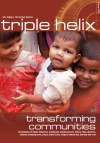Winner of the 'First Edition Medical Books for the General Reader' category at 'The Society of Authors and The Royal Society of Medicine Books Award 2005'
This book is written by a Christian doctor for the benefit of those who find themselves caring for someone who is suffering from cancer, and throughout its pages there is the stamp of authenticity from one who has been both a patient and a carer. Wesley Finegan combines his specialist knowledge of palliative care with his own experience of being a cancer patient, and more recently of being a family carer himself, to produce a practical guide that will prove invaluable to anyone taking on the daunting task.
The book deals with a range of physical and psychological problems, issues around communication, cancer treatments, dying and bereavement. It is split into short topically based chapters, and can be read cover-to-cover or dipped into as relevant issues arise. The style and format make it easy to read, and he makes every effort to get beyond the jargon to make the information accessible. It is packed with practical advice, and it provides answers to many of the questions that are often asked. It also encourages the carer to work together with the patient and health professionals to achieve realistic and mutually agreed outcomes.
While this book is primarily for carers, I believe any professional who may be involved in the care of a patient with cancer would do well to read it. I was struck by the depth of insight into the carer's perspective that it conveys, and I think I have come away with a better understanding that will inform my own practice. If I were a lay person caring for a friend or relative with cancer I would want to have this book to help me. Yet many carers may never know that such a book exists – unless we have read it and are prepared to point them in the direction of the help and advice that is available.
Wesley Finegan writes from the perspective of one who has specialist knowledge but who has also experienced the 'subject' first-hand. He also writes as a Christian. While he makes specific mention of his own faith in one or two places, I sensed that in some intangible way his witness permeates every page of this book. Perhaps it is the quiet compassion and humility of one who has experienced suffering, and who has not been diminished by it. What is certain is that in some way this book is further testament to the grace of God who can work all things together for good to those who love him (Romans 8:28).
































